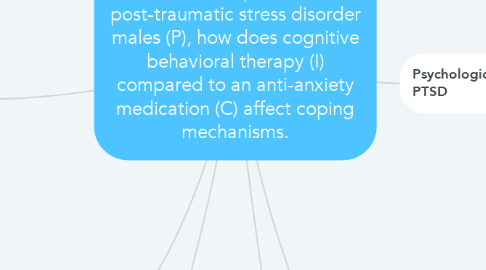
1. Pharmacological Treatments
1.1. Fluoxetine
1.1.1. Reduced PTSD Symptoms
1.1.1.1. Moderate evidence to support
1.1.2. Reduction in depression symptoms
1.1.2.1. Low evidence to support
1.2. Paroxetine
1.2.1. Reduced PTSD Symptoms
1.2.1.1. Moderate evidence to support
1.2.2. Greater PTSD symptom remission
1.2.2.1. Moderate evidence to support
1.2.3. Reduced depression symptoms
1.2.3.1. Moderate evidence to support
1.3. Sertraline
1.3.1. Reduced PTSD symptoms
1.3.1.1. Low evidence to support
1.3.2. Reduction in depression symptoms
1.3.2.1. Low evidence to support
1.4. Venlafaxine
1.4.1. Reduced PTSD Symptoms
1.4.1.1. Moderate evidence to support
1.4.2. Greater PTSD symptom remission
1.4.2.1. Moderate evidence to support
1.4.3. Reduced depression symptoms
1.4.3.1. Moderate evidence to support
1.5. Olanzapine
1.5.1. Reduced PTSD symptoms
1.5.1.1. Low evidence to support
1.6. Risperidone
1.6.1. Reduced PTSD Symptoms
1.6.1.1. Low evidence to support
2. Pharmacological Treatments
2.1. Evidence of treatment efficacy was most convincing for the SSRIs.
2.2. Medication was superior to placebo in reducing the severity of PTSD symptom clusters, comorbid depression and disability.
2.2.1. Medication was also less well tolerated than placebo.
2.3. Long-term medication may be required for treating PTSD.
3. Integrated Cognitive Behavioral Therapy
3.1. Greater reduction of re-experiencing symptoms with ICBT relative to standard VA care alone.
3.1.1. This is relating to military personnel who acquired PTSD in Iraq or Afghanistan.
4. Psychological interventions for PTSD
4.1. When TF-CBT was compared to the care usually received, no effect for reducing PTSD, psychotic, depressive or anxiety symptoms or improving quality of life, was noted.
4.2. People with SMI and PTSD receiving TF-CBT were more likely to recover from PTSD.
4.3. TF-CBT was not linked to an increase in side effects.
4.4. People recieving EMDR against those awaiting treatment showed a favorable effect for reducing the symptoms of PTSD.
4.5. A comparison of TF-CBT with EMDR indicated no difference in reduction of PTSD symptom severity.
5. Treatments identifying ways to improve care for PTSD patients.
5.1. Cognitive processing therapy.
5.1.1. Reduced PTSD symptoms
5.1.1.1. Moderate evidence to support
5.1.2. Loss of PTSD diagnosis
5.1.2.1. Moderate evidence to support
5.1.3. ReducedDepression Symptoms
5.1.3.1. Moderate evidence to support
5.2. Cognitive therapy
5.2.1. Reduced PTSD symptoms
5.2.1.1. Moderate evidence of support
5.2.2. Loss of PTSD diagnosis
5.2.2.1. Moderate evidence to support
5.2.3. Reduced Depression symptoms
5.2.3.1. Moderate evidence to support
5.3. Cognitive behavioral therapy-exposure
5.3.1. Reduced PTSD symptoms
5.3.1.1. High evidence to support
5.3.2. Loss of PTSD Diagnosis
5.3.2.1. High evidence to support
5.3.3. Reduced Depression symptoms
5.3.3.1. High evidence to support
5.4. Cognitive behavioral therapy-mixed
5.4.1. Reduced PTSD symptoms
5.4.1.1. High evidence to support
5.4.2. Loss of PTSD diagnosis
5.4.2.1. High evidence to support
5.4.3. Reduced Depression symptoms
5.4.3.1. High evidence to support

